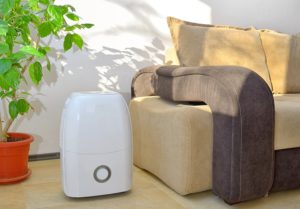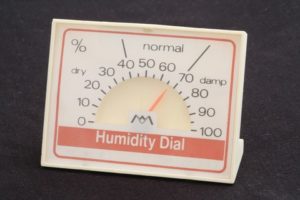Blog

A dehumidifier improves indoor air quality in the summer by removing excess moisture in the air. This helps eliminate airborne pollutants that make it hard to breathe. You’ll also feel cooler and less “sticky” even when you’re dehumidifying without air conditioning.
In fact, dehumidification is a crucial part of the air conditioning process. Every AC, from window units up to central air and ductless cooling, does it. But, if you’re not running your AC, you’re not getting that effect. And, sometimes you need a little extra help. That’s when a separate unit comes in handy.
So how do you know if you need one? And can you make do with the kind you buy at a hardware store? Or will you need something more powerful? We’ll help you make sense of it all in this article, starting with what you need to measure, how it all works, and how to find the best option for your home.
Of course, there’s more to it than we can cover in one post. So, if you have questions, or if you’re looking for ways to improve the air quality in your home in or around York, PA, call or email us at Air Comfort.
Click to Schedule an Appointment
Now, let’s start with the basics.
Relative Humidity and Absolute Humidity
First off, let’s understand the terminology and why it’s important: Absolute humidity measures the actual amount of water vapor in the air. Relative is the more common gauge. It gives you a percentage of water vapor that relates to the temperature of the air.
The relative measure is the one you see on weather reports, and it’s more useful because it’s a better indicator of how the air feels. Warm air, by nature, holds more water vapor than cold air. It’s why high humidity is a problem in the summer but not the winter: the colder the air, the drier it is.
Extremes on either side of the spectrum cause problems, but in the summer we’re worried about it being too high. That said, you want to keep the relative humidity between 40 and 60 percent all year long.
Do I Need a Dehumidifier For My Home in York, PA?
If you don’t have central air, or experience any of these air quality problems during the summer, then your home in York, PA may need a dehumidifier:
- You Feel Hot and Sticky
- Asthma or Allergy Symptoms Flare Up
- Damage to Books and Furniture
Let’s unpack these.
You Feel Hot and Sticky
 You know the phrase, “It’s not the heat, it’s the humidity?” Well, that’s why you feel hot and sticky — and probably tired of hearing that old cliche. But, it rings true: Excess moisture in the air makes you hot and uncomfortable.
You know the phrase, “It’s not the heat, it’s the humidity?” Well, that’s why you feel hot and sticky — and probably tired of hearing that old cliche. But, it rings true: Excess moisture in the air makes you hot and uncomfortable.
Your body gets rid of extra heat by sweating. But, water vapor around you acts like a blanket. The sweat can’t evaporate, so the heat — and moisture — stays on your body. That’s why you’re still overheating and uncomfortable under that sticky, salty film of sweat.
Asthma or Allergy Symptoms Flare Up
Symptoms of seasonal allergies, asthma, and other respiratory problems often flare up due to particles in the air. It happens when you’re breathing in pollen, dust or other irritants that make you sneeze, cough, or otherwise have trouble breathing.
Now, when the air is dry, those particles are more likely to fall to the ground or onto another surface. But, they can also attach to water molecules in the air. Then, you’re more likely to breathe them in, because they’re hanging near your nose and mouth.
Damage to Books and Furniture
Here are two signs your humidity is really high: Warped wood and wavy books. When there’s way too much moisture in the air, it’ll start affecting your belongings as well as your health.
In the case of furniture and paper, these objects naturally absorb some of the moisture in teh air Too much and they begin distorting.
So, now that we know the warning signs, how do we dial it all in?
Click to Schedule an Appointment
Dehumidifiers and Air Conditioning
If you have air conditioning, you’re already addressing these problems. But, it may not be enough.
Central air treats the whole-house, but the system cycles on and off. When it’s not cooling, it’s also not removing moisture. Window or through-the-wall units are always on, but they only handle one room at a time.
Your best bet is a ductless system, because they run almost constantly in a low-power mode. That keeps your energy bills low and your home cool and dry. But, if you’re not ready for that upgrade yet, let’s talk standalone units.
Without diving into the dozens of brands and models, we’ll narrow your choices down to two: room units or whole-home systems.
You’ve seen room units in hardware stores or online. They’re relatively inexpensive and easy to use: Plug them in, turn them on, and adjust the settings. Every so often you’ll need to empty the reservoir, but that’s it.
These are great if you’re only looking for a little extra push, or maybe one or two rooms needs a little extra treatment. They’re also effective in the basement, because that’s where the majority of moisture gets in to your home.
If that’s not enough, then it’s time to get a system that treats your entire home. That’s when you’ll need your HVAC contractor, because the model you’re looking for attaches directly to your heating and cooling system.
That way, it uses the ducts and vents to capture moisture from all over the house. And, these are much more set-it-and-forget it. You’ll have a humidistat — like a thermostat but for moisture — that tells it when to turn on and off. They also drain on their own, just like ACs.
Dehumidifiers and Indoor Air Quality in York, PA
If you’re unsure of what your home needs, call or email us here and Air Comfort. Starting with a consultation, we’ll assess your house and help you find the system that’s just right for you.
Click to Schedule an Appointment

